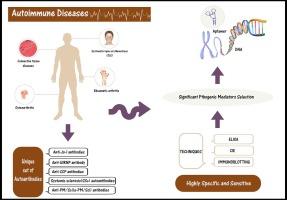Biosensors for autoimmune diseases
IF 3.2
3区 医学
Q2 MEDICAL LABORATORY TECHNOLOGY
引用次数: 0
Abstract
Diagnosis of autoimmune diseases (ADs) is usually based on symptoms and laboratory tests that measure the occurrence of serological and genetic biomarkers such as peptides, autoantibodies, and complement proteins. Early detection of AD is essential to reduce the severity of symptoms and organ damage as a result of progressive disease. Biosensors are tools that convert biochemical signals produced by molecular elements into optical, electrical, and other physical signals for analysis. In recent years, peptides, antigens, aptamers, autoantibodies, and other biomolecules have provided suitable diagnostic features for development of biosensors in detecting and follow up the diagnoses and treatment of diseases. This study reviews the introducing of different biomarkers in ADs with the novel vision to use of biosensor technology for research and development in this regard. Therefore, this study has the required innovation for using biosensor technology with more attention to electrochemical based biosensors to developing, targeting and designing the easy applicable and available diagnostic and response to treatment products using key biomolecules for ADs. It will help readers to understand the research trends of biosensors in ADs and further advance the development of this paramount field.

治疗自身免疫性疾病的生物传感器。
自身免疫性疾病(AD)的诊断通常基于症状和实验室检测,这些检测可测量血清学和遗传学生物标记物(如肽、自身抗体和补体蛋白)的发生。及早发现 AD 对于减轻症状的严重程度和疾病进展对器官造成的损害至关重要。生物传感器是将分子元素产生的生化信号转化为光学、电学和其他物理信号进行分析的工具。近年来,肽、抗原、适配体、自身抗体和其他生物大分子为生物传感器的开发提供了合适的诊断功能,用于检测和跟踪疾病的诊断和治疗。本研究回顾了在注意力缺失症中引入不同生物标志物的情况,并以新颖的视角将生物传感器技术用于这方面的研究和开发。因此,本研究对生物传感器技术的使用进行了必要的创新,更加关注基于电化学的生物传感器,以开发、瞄准和设计出易于应用且可用的诊断和响应治疗产品,使用关键的生物分子来治疗 ADs。它将帮助读者了解 ADs 生物传感器的研究趋势,并进一步推动这一重要领域的发展。
本文章由计算机程序翻译,如有差异,请以英文原文为准。
求助全文
约1分钟内获得全文
求助全文
来源期刊

Clinica Chimica Acta
医学-医学实验技术
CiteScore
10.10
自引率
2.00%
发文量
1268
审稿时长
23 days
期刊介绍:
The Official Journal of the International Federation of Clinical Chemistry and Laboratory Medicine (IFCC)
Clinica Chimica Acta is a high-quality journal which publishes original Research Communications in the field of clinical chemistry and laboratory medicine, defined as the diagnostic application of chemistry, biochemistry, immunochemistry, biochemical aspects of hematology, toxicology, and molecular biology to the study of human disease in body fluids and cells.
The objective of the journal is to publish novel information leading to a better understanding of biological mechanisms of human diseases, their prevention, diagnosis, and patient management. Reports of an applied clinical character are also welcome. Papers concerned with normal metabolic processes or with constituents of normal cells or body fluids, such as reports of experimental or clinical studies in animals, are only considered when they are clearly and directly relevant to human disease. Evaluation of commercial products have a low priority for publication, unless they are novel or represent a technological breakthrough. Studies dealing with effects of drugs and natural products and studies dealing with the redox status in various diseases are not within the journal''s scope. Development and evaluation of novel analytical methodologies where applicable to diagnostic clinical chemistry and laboratory medicine, including point-of-care testing, and topics on laboratory management and informatics will also be considered. Studies focused on emerging diagnostic technologies and (big) data analysis procedures including digitalization, mobile Health, and artificial Intelligence applied to Laboratory Medicine are also of interest.
 求助内容:
求助内容: 应助结果提醒方式:
应助结果提醒方式:


